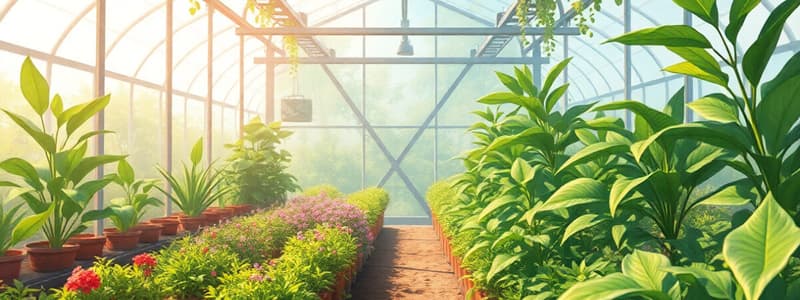Podcast
Questions and Answers
What is the recommended treatment method and duration for using heat as an agent for disinfection?
What is the recommended treatment method and duration for using heat as an agent for disinfection?
- Methyl bromide for 1-3 days
- Chloropicrin for 24-48 hr
- Formalin for 14-36 hr
- Steam for 30 min at 180˚ F (correct)
How long should methyl bromide be allowed to aerate before use?
How long should methyl bromide be allowed to aerate before use?
- 1-3 days
- 30 min
- 24-28 hr (correct)
- 14 days
What is the recommended application rate of chloropicrin (tear gas) for treatment?
What is the recommended application rate of chloropicrin (tear gas) for treatment?
- 8.0 g/cu.ft. of medium
- 3-5 ml/cu.ft. of medium (correct)
- 10 ml/cu.ft. of medium
- 20 ml/l of water
What should be done after applying basamid to the medium?
What should be done after applying basamid to the medium?
What should be done to disinfect physical propagation facilities?
What should be done to disinfect physical propagation facilities?
What is one potential disadvantage of untreated wooden benches?
What is one potential disadvantage of untreated wooden benches?
Which of the following is NOT a recommended method for disinfecting seeds before entering a greenhouse?
Which of the following is NOT a recommended method for disinfecting seeds before entering a greenhouse?
What is an important feature of benches used for pot plants in a greenhouse?
What is an important feature of benches used for pot plants in a greenhouse?
Which light range is most desirable for supplemental photosynthetic lighting in greenhouses?
Which light range is most desirable for supplemental photosynthetic lighting in greenhouses?
What effect does reducing far-red light and increasing blue light have on plants?
What effect does reducing far-red light and increasing blue light have on plants?
Which of the following plants requires the highest optimal light level?
Which of the following plants requires the highest optimal light level?
What is the purpose of greenhouse glazings developed with additives or pigments?
What is the purpose of greenhouse glazings developed with additives or pigments?
Which method is NOT commonly used to reduce light levels in greenhouses?
Which method is NOT commonly used to reduce light levels in greenhouses?
What is the primary purpose of pinching the first flower after one month from planting a rose plant?
What is the primary purpose of pinching the first flower after one month from planting a rose plant?
How does plant spacing affect light levels in a greenhouse?
How does plant spacing affect light levels in a greenhouse?
Which light quantity range is required for crops like cucurbits and sweet potato?
Which light quantity range is required for crops like cucurbits and sweet potato?
How much water do rose plants require daily for optimal growth?
How much water do rose plants require daily for optimal growth?
What does bending the mother shoot towards the path achieve in rose plant cultivation?
What does bending the mother shoot towards the path achieve in rose plant cultivation?
Which aspect of light quality is crucial for affecting phytochrome photoreceptors?
Which aspect of light quality is crucial for affecting phytochrome photoreceptors?
Which of the following practices is performed after four and a half months from planting roses?
Which of the following practices is performed after four and a half months from planting roses?
What is a consequence of bending in rose plants?
What is a consequence of bending in rose plants?
Why is it important to manage weak shoots in rose plant cultivation?
Why is it important to manage weak shoots in rose plant cultivation?
Which cultural practice is NOT recommended for rose plants?
Which cultural practice is NOT recommended for rose plants?
What is the significance of removing buds from a bended stem in rose cultivation?
What is the significance of removing buds from a bended stem in rose cultivation?
What is the ideal flower yield of roses per square meter?
What is the ideal flower yield of roses per square meter?
What should be done immediately after cutting the stems of roses?
What should be done immediately after cutting the stems of roses?
At which stage should roses be cut for optimal development?
At which stage should roses be cut for optimal development?
What is important for preventing vascular blockage after harvesting roses?
What is important for preventing vascular blockage after harvesting roses?
What is the benefit of using BAP before the flowering flush?
What is the benefit of using BAP before the flowering flush?
What temperature range is ideal for storing roses in cold storage?
What temperature range is ideal for storing roses in cold storage?
How long can roses be kept in a preservative solution in cold storage without suffering longevity issues?
How long can roses be kept in a preservative solution in cold storage without suffering longevity issues?
What is the recommended pH level for the water used in hydrating roses?
What is the recommended pH level for the water used in hydrating roses?
What is the primary role of sucrose in floral preservative composition?
What is the primary role of sucrose in floral preservative composition?
Which of the following pests is NOT listed as a principal pest of roses?
Which of the following pests is NOT listed as a principal pest of roses?
What is the recommended volume of preventive spray for controlling pests and diseases?
What is the recommended volume of preventive spray for controlling pests and diseases?
Which of the following diseases is associated with roses?
Which of the following diseases is associated with roses?
What is the optimal interval suggested for the preventive spray program?
What is the optimal interval suggested for the preventive spray program?
Which material is recommended for long-term transport of flower bunches?
Which material is recommended for long-term transport of flower bunches?
How are rose stems typically prepared for packing?
How are rose stems typically prepared for packing?
How many stems can typically fit in a box meant for transporting roses?
How many stems can typically fit in a box meant for transporting roses?
Flashcards are hidden until you start studying
Study Notes
Controlling CO2 in Greenhouses
- A single sensor receives information from multiple sampling tubes and controls CO2 generators in each greenhouse
Controlling Light in Greenhouses
- Light Quality:
- Broad light spectrum from 400 to 700 nm is desirable
- Red light is important for photoreceptor
- Reducing far-red and increasing blue light results in shorter, darker, and stronger plants
- Greenhouse glazings can filter specific wavelengths to change light ratios
- Light Quantity:
- Different species have different optimal light levels
- Plant spacing, nutrition, and age can affect light levels
- Cucurbits, capsicum, brinjal, and sweet potato require 32.2 to 86.1 klux light levels
- Cabbage and potato require 21.5 to 86.1 klux light levels
- Recommended Light Levels (in moles/m2/sec):
- African violet: 150 – 250
- Foliage plants: 150 – 250
- Carnation, Chrysanthemum, Geranium, Cucumber, Lettuce, and Strawberry: 250 – 450
- Roses and Tomato: 450 – 750
- Greenhouse Shading Methods:
- Shading compounds on glazing
- Retractable shade systems
Greenhouse Sanitation
- Disinfecting Facilities:
- Propagation rooms, containers, flats, knives, working surfaces, benches, etc. can be disinfected using formalin or sodium hypochlorite solutions
- Regular insecticide spraying addresses insects
- Seed or planting materials should be disinfected before moving into the greenhouse
- Greenhouse Entry:
- Disinfectant solutions like trisodium phosphate or potassium permanganate at the entry helps eliminate pathogens from personnel
Benching
- Benches raise plants off the greenhouse floor, preventing diseases and improving light conditions
- Tiered benches optimize space utilization
- Benches can be made of metal, wood, or plastic
- Wooden benches require preservative treatments to prevent rot and pests
Irrigation and Drainage in Rose Cultivation
- Rose plants require a lot of water, at least 6 mm/day (about 60 cum/ha/day)
- Drainage lines below beds are essential for excess water disposal
Cultural Practices for Rose Cultivation
- Initial Plant Development:
- Pinch first flower to promote branching growth
- Bend the mother shoot towards the path to initiate bottom break ground shoot
- Plant Structure Development:
- Bend weak ground shoots at ground level
- Cut strong ground shoots after four and a half months from plantation
- Bending:
- Maximizes leaf area for strong root system
- Removes suckers and buds to control pests and diseases
- Breaks apical dominance
- Support System:
- Provides stability and makes intercultural operations easier
- Pruning:
- Stems are cut back to 4-5 nodes, removing weak shoots
- Phased pruning ensures flowering from September to March
Rose Harvesting, Post-Harvest Management, and Pests/Diseases
- Harvesting:
- Roses should be cut at the right stage, when buds are opening and color is visible
- Cut stems are immediately placed in citric acid solution or chrysal – RVB
- Ideal flower yield is 250-350 stems/m2
- Hydration:
- Recut stems and place them in warm water with citric acid to prevent vascular blockage
- Preservatives:
- Preservatives with citric acid, HQC/captan, sucrose, STS, and cytokinin are used to extend longevity
- Packing:
- Roses are bunched, wrapped, and packed in boxes
- Boxes can contain one variety, one grade, or mixed colors
- Pests:
- Red spider mite
- Leaf rollers
- White fly
- Thrips
- Aphids
- Nematode
- Diseases:
- Powdery mildew
- Downy mildew
- Botrytis
- Pruning die back
- Black leaf spot
- Control:
- Preventive spray program with Dithane M-45, Metasystox, and Karathane
Perpetual Carnation – Dianthus caryophyllus
- Important cut flower due to its long vase life, diverse colors, and forms
- Two main types: Standard and Spray carnations
Studying That Suits You
Use AI to generate personalized quizzes and flashcards to suit your learning preferences.




